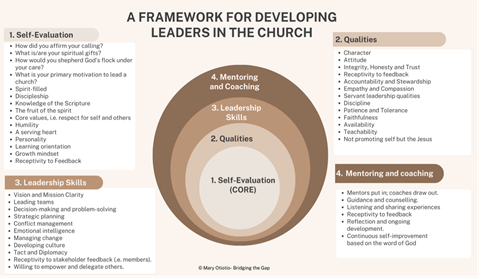Advertisement feature
“Without strong leadership, the spiritual vitality of a church begins to crumble. When this happens, not only do those who are a part of the church begin to lose steam, the community that surrounds it does not see the church as a beacon in the community, or worse, they reject the church all together” (globalleadership.org)

The above quotation by the Global Leadership Network, a non-profit organisation whose mission is to equip leaders around the world, highlights the critical role of leadership in the church. Leaders are the secret weapon in any organisation. They are vision carriers and have the capacity to create or destroy value. It is often said that the quality of leadership will be reflected in the people they lead and vice versa. The fact that someone has become a leader in a church does not automatically mean they have the skillset or mindset to lead the people of God. Leadership is a multi-faceted function that requires different skills. A leader may be great at preaching fascinating and engaging sermons but needs to gain basic leadership skills because these are not often incorporated into their training and development. As Graham Archer of CPAS (Church Pastoral Aid Society) says, “Most leaders have received significant ministry training but very thin leadership training.” It is incumbent for churches to bridge this gap by investing in effective leadership training, coaching and mentoring.
Unfortunately, the development of leaders is not often considered in line with other strategic objectives of the church. While a handful of churches train and mentor their leaders, others tend to practice “leadership placement”, meaning they place individuals in leadership positions depending on their affiliation, commitment and loyalty to senior leaders or the ‘owner’ of the church (if it is a non-denominational or non-accountable structure). The problem with this approach is that it leaves inexperienced leaders vulnerable because they are unaware of fundamental leadership principles and, therefore, more likely to misuse, abuse power, and look out for their own interests, which ultimately feed into the culture of the church. The ultimate result in such settings as would be expected is a complete shift away from the objectives of the church: to make Jesus known and advocate the great commission.
The composite framework in Figure 1 suggests a more holistic approach for developing and equipping leaders. The framework is made up of several elements grouped within four domains, namely, self-evaluation, qualities, leadership skills and mentoring and coaching.
The model is not only suitable for new leaders but also for experienced leaders, who need to identify specific areas that require improvement. For example, a leader who has been in ministry for years but needs to be more skilled at engaging with the congregants may need to reflect on his or her style of communication, emotional intelligence and decision-making skills (part of level 3).

Level 1 – Self-evaluation (CORE)
Self-evaluation is the foundation of good leadership. It is even more paramount for Christian leaders to do a lot of soul-searching and be honest about their motive to serve and lead the people of God. This process creates an opportunity to assess their calling and readiness to take on the mantle of leadership.
As shown in the framework, the self-evaluation elements allow prospective leaders to examine themselves, affirm their calling and identify their strengths and weaknesses. It also creates an opportunity to examine their core values. Some may only identify specific areas to improve. It is worth mentioning that we are not looking for perfect leaders - they do not exist. The criteria for selecting leaders in the church is clearly set out in Titus, one of the pastoral epistles.
Level 2 – Qualities
There are specific qualities expected of Christian leaders to ensure they fulfil the demands of their roles effectively. Leaders are role models and are expected to develop their faith and maintain a high moral and ethical standard. Having the right qualities also means they are better positioned to guide and encourage their congregants to strengthen their faith. The qualities outlined should support the growth and development of the leader. Accountability, stewardship and discipline are crucial in church leadership. However, these all depend on the leader’s character and integrity.
Level 3 – Leadership Skills
Many leaders within Christian circles and churches, in particular, grow into their roles without any form of leadership training or development, and the gaps are usually evident. Some are influenced by their national culture, which sometimes ignores the principles of effective leadership, and it often reveals a high-power distance between the leader and the followers/congregants. There is a massive gap between those who have been equipped with the principles of leadership and those who have not. The focus on spiritual gifts is great, but without good leadership skills, leaders will create their worldview of how they want to lead, especially if the church is owned by an individual who lacks accountability to the elders and members. Ultimately, other leaders may end up emulating such behaviour and eventually, it becomes part of the church culture.
Level 4 – Coaching and Mentoring.
It is quite common to hear Christian leaders refer to their “spiritual fathers” or “spiritual mentors.” However, the focus, as usual, is on spiritual guidance and development, but it is not sufficient. Mentoring is an aspect of discipleship that equips the leader to grow. There are several examples of mentoring relationships in the scriptures, for example, Moses and Joshua, Elijah and Elisha, Paul and Timothy. Some organisations have set out mentoring guides and programmes specifically tailored for churches. Coaching, on the other hand, is rarely discussed in Christian leadership circles. The usefulness of coaching in this framework enables the leader to identify specific areas they want to improve. Unlike other developmental initiatives, such as mentoring or training, that are targeted at specific goals and expectations, coaching tends to focus on topics and issues identified by the person being coached. By working closely with the Christian coach, the individual sets the agenda and highlights their goals, and there is more emphasis on individual accountability. Coaching is a rewarding experience, but it may be difficult for some leaders, particularly those who believe they are more knowledgeable and experienced, to partake in the process.
Having a framework of this nature provides the opportunity to start a conversation about leadership development in the church. The application and suitability of the model will depend on a wide range of factors. Firstly, the readiness and willingness of leaders to accept that there is a gap between their current level of awareness and where they need to be. They also need to understand that leadership is a process, and there is always an opportunity to develop, learn something new and step out of the comfort zone into the growth zone. Secondly, it will depend on the culture of the church and whether the senior leadership team supports learning and development. Thirdly, it depends on whether the leaders believe the church should only focus on spiritual matters and ignore other organisational issues. If these factors set out in the framework are carefully embedded in churches, it will go a long way to equipping and preparing leaders before they take up the mantle of leading God’s people.

Dr Mary Otiotio is a certified leadership trainer, coach, and DISC behavioural assessment consultant with Maxwell Leadership. She also lectures in leadership and management. Her book, Bridging the Gap: Leadership Development in the Church, explores the unique challenges of leading faith-based organisations based on Scriptures and secular leadership literature and offers practical guidance on navigating these complexities. The book serves as a valuable resource for individuals seeking to bridge the gap between their spiritual calling and effective leadership in a church setting, and it is currently available on Amazon.
https://www.amazon.co.uk/Bridging-Gap-Leadership-Development-Church

























